Alcohol Withdrawal
Table of Contents
Statistics for Alcohol Addiction & Alcohol Withdrawal
According to recent surveys, one out of every eight individuals living in the United States is addicted to alcohol. Alcohol has become the most commonly abused substance throughout the country. Alcohol addiction is responsible for harming both society as a whole and individual families, causes extremely serious and fatal accidents and even kills. In spite of all of these dangers, alcohol has become an important part of numerous milestones common in modern society.
Alcohol is frequently served at weddings, graduations, parties and in homes all over the country. Alcohol is consumed by more than two-thirds of the population. Despite this, as much as 50 percent of all alcohol purchased and served in the country is consumed by approximately 10 percent of the population. This article covers the withdrawal symptoms, withdrawal timeline and the best options for finding relief from both alcohol addiction and the painful symptoms.
Alcohol and Driving
Alcohol impairment is extremely dangerous for all drivers, but especially commuters. Every day, 29 people in the United States lose their lives due to accidents involving drunk drivers. Crashes involving drunk drivers result in a massive cost of more than 44 million dollars every year. An additional 200 billion dollars is directly attributed to drunk driving crashes including:
- Medical expenses
- Insurance
- Lost wages
- EMS service costs
- Property damage
- Productivity
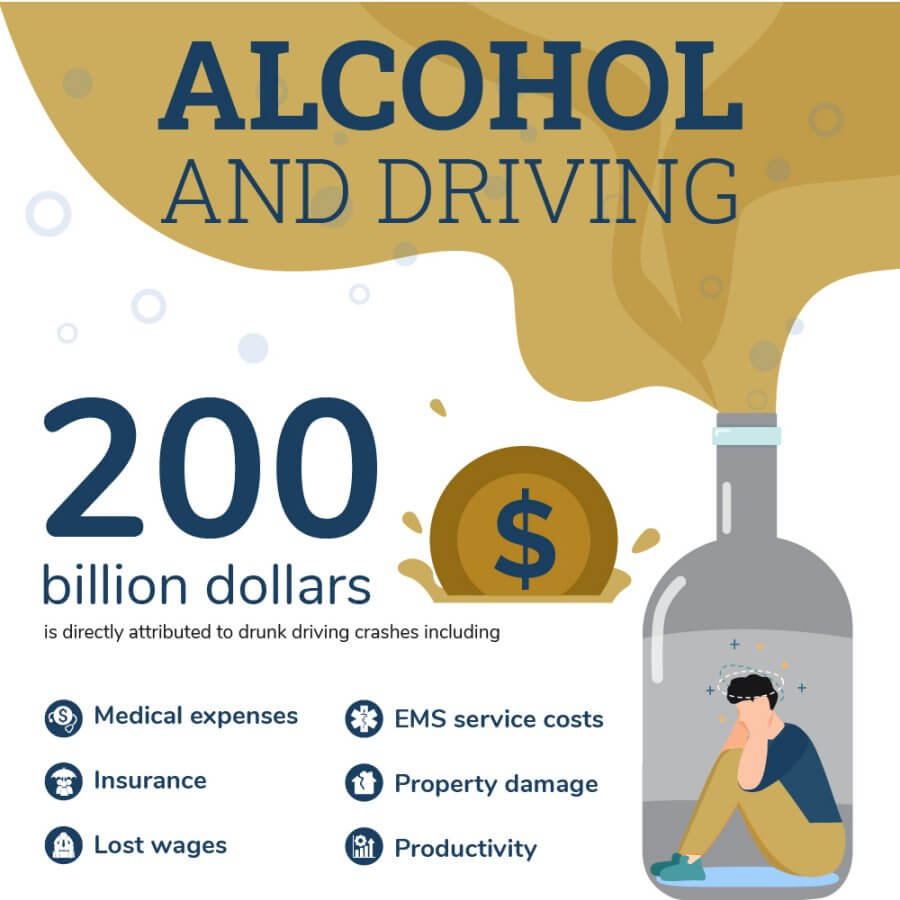
Any individual driving with a BAC or a blood alcohol level above the .08 legal limit can be charged substantial fees or sentenced to spend time in jail. These individuals can lose their driver’s licenses for several years. The result is even more lost productivity and wages. The average cost of drunk driving charges, jail time, insurance, attorney fees and impound is between $10,000 and $15,000. This places additional strain on anyone suffering from alcohol addiction.
The Dangers of Alcohol Abuse
An individual with an alcohol addiction lasting for a long period of time is especially dangerous. These people have an extremely difficult time quitting. Seizures and tremors are common. Those in recovery can develop delirium tremens. This condition is dangerous because the individual can lapse into a coma and die while attempting to get clean. Withdrawal symptoms begin approximately eight hours after the individual has finished their last drink, often lasting for several weeks.
Alcohol is involved in 40 percent of all arrests for violent crimes. Approximately 50 percent of all inmates sentenced to jail are struggling with alcohol addiction. Alcohol is also a factor in more than 40 percent of all suicide attempts in the United States every year. The prevalence of alcohol makes it incredibly dangerous for anyone with an inclination for substance abuse.
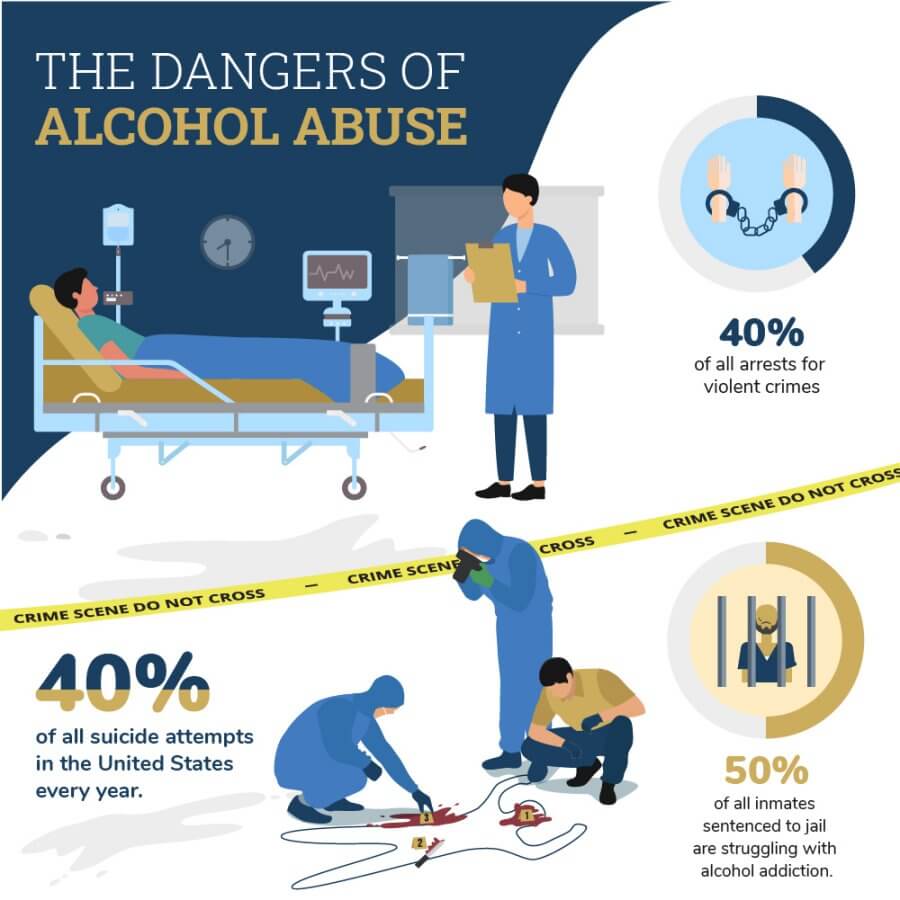
An individual with an alcohol addiction lasting for a long period of time is especially dangerous. These people have an extremely difficult time quitting. Seizures and tremors are common. Those in recovery can develop delirium tremens. This condition is dangerous because the individual can lapse into a coma and die while attempting to get clean. Withdrawal symptoms begin approximately eight hours after the individual has finished their last drink, often lasting for several weeks.
Alcohol is involved in 40 percent of all arrests for violent crimes. Approximately 50 percent of all inmates sentenced to jail are struggling with alcohol addiction. Alcohol is also a factor in more than 40 percent of all suicide attempts in the United States every year. The prevalence of alcohol makes it incredibly dangerous for anyone with an inclination for substance abuse.
Alcohol is different than illicit drugs purchased on the street. This is because a lot of effort is usually required to find a specific drug. By comparison, alcohol is easily obtainable. Due to the legality of alcohol, family and friends have much more difficulty recognizing the alcohol addiction of a loved one. There are specific signs often found with alcohol addiction including:
- Cravings for alcohol
- Irritability
- Financial issues
- Inability to do anything without consuming alcohol first
- Feelings of guilt
- Issues with the law such as car crashes and DUIs
- Drinking in secret or alone
- Injuries resulting from alcohol impairment
- Withdrawal symptoms including anxiety or sweating
- Relationship issues
- Drinking alcohol as soon as the individual wakes up in the morning
- Inability to control or stop alcohol consumption regardless of negative consequences
- Smelling of alcohol
Alcohol and Recovery
Alcohol addiction is extremely complicated for individuals in recovery. In order to maintain sobriety, the individual needs ongoing support and maintenance plans. This help is crucial for success. The withdrawal symptoms for long-term alcohol addiction and abuse can be very painful. Unfortunately, the symptoms of withdrawal can be fatal.
Encouragement and support from friends and families for their loved ones to receive help from trained professionals is critical. Anyone attempting to recover from an addiction to alcohol can have potentially dangerous medical complications. The symptoms of withdrawal can persist for weeks or even months.
The Timeline for Alcohol Withdrawal
The timeline for withdrawal consists of three different stages. The first stage starts as quickly as eight hours or less once the individual has consumed their last alcoholic drink. Stage two begins within 24 hours after the last drink is consumed and lasts for 72 hours. The final stage starts 72 hours after the individual has had their last drink. This stage is generally painful, intense, and when potentially fatal complications can occur.
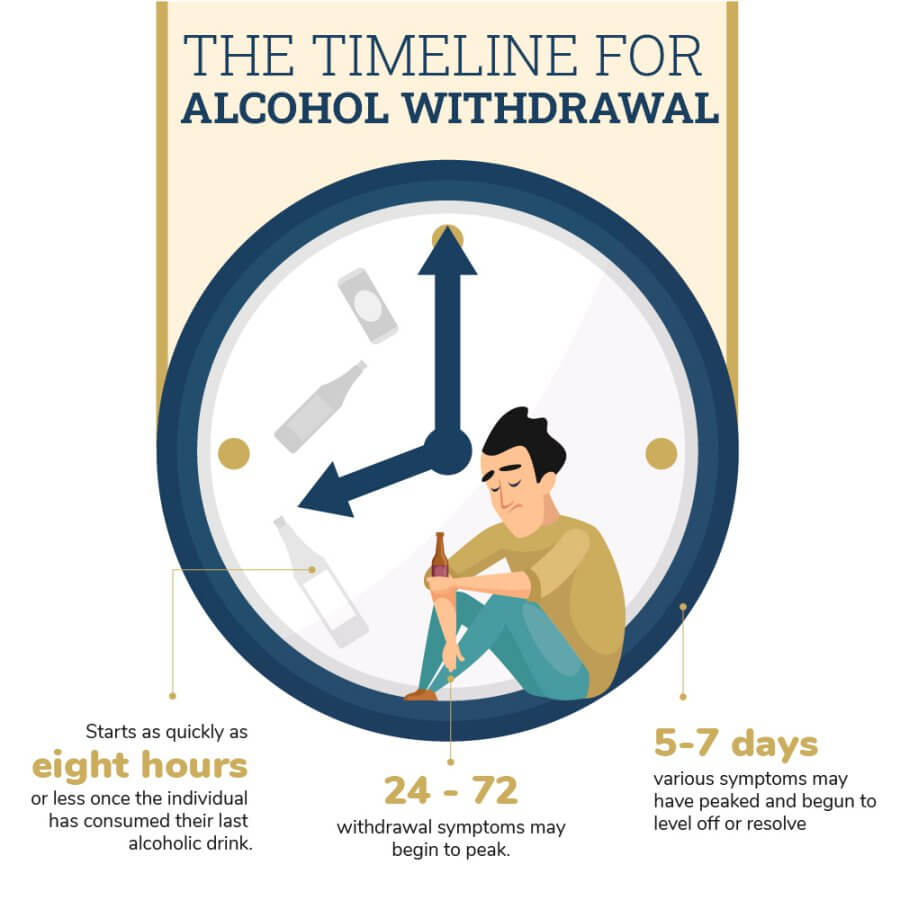
Stage three lasts as long as seven days. This is when the symptoms will start to subside. If the individual has been abusing alcohol for a long period of time, or is experiencing comorid conditions due to complications resulting from alcohol addiction, the consequences can be lingering effects or permanent health issues or conditions. If the individual does not receive treatment from medical professionals, the symptoms of withdrawal can last for weeks after consuming the final drink.
Physical Symptoms Experienced During Alcohol Withdrawal
When the individual is in the first stage of withdrawal, they can experience nausea, stomach pains and insomnia. During the second stage, the symptoms can include changes in their heart rhythm, increased body temperature and high blood pressure. Individuals with suspected cardiovascular issues or cardiovascular problems must be monitored by medical professionals for any signs of a stroke or heart attack.
During the progression of the third withdrawal stage, individuals in recovery usually have a fever. There is also a potential for delirium tremens. This is a dangerous condition resulting in the individual developing a dangerous fever, seizures and tremors. In some instances, the individual slips into a coma, goes into respiratory arrest and does not survive.
There are potential issues regarding coordination and motor control for the long-term. There is even a possibility of hearing loss. If the individual experienced trauma, suffered from an injury or had an accident resulting from alcohol abuse, muscle and joint issues and arthritis can develop.
Get Help Now (949) 763-3440
If you are struggling and need help, do not waste one more minute. Call us right now to get the help you deserve.
Emotional and Psychological Issues Experienced During Withdrawal
Individuals suffering from alcohol withdrawal will experience hallucinations, agitation, anxiety and confusion. During the long-term, issues with regulating emotions and memory problems are possible. Even after the individual is recovered from active addiction, they will struggle with occasional cravings. In most cases, this is followed by a clinical depression episode.
Support and ongoing therapy from both the community and loved ones are essential for an individual with alcohol addiction to remain sober and deal with any long-term issues in a productive and positive way. If the individual does not receive any help, the risk of them harming themself or relapsing increases.
Is A Medical Detox Center Necessary For Alcohol Withdrawal or Can the Individual Quit Cold-Turkey?
Quitting alcohol without any medical supervision is not safe. This is especially true if the individual is suffering from long-term addiction. If the person stops cold-turkey, the symptoms of withdrawal can be significantly more intense or severe. A medical detox facility is necessary to safely taper off the amount of alcohol under the supervision of a doctor. The physician can also prescribe medications such as benzodiazepines to help the individual taper off alcohol use.
Which Measures are Safe for Alcohol Detox?
Individuals in recovery can safely taper off alcohol with the following methods.
- Anti-anxiety medication
- Sleep aids for the short-term only
- Benzodiazepines
- Mood stabilizers
- Small amounts of alcohol
Doctors in a medical detox center are on-call 24/7 to help with severe symptoms of alcohol withdrawal. If the individual experiences dangerous issues from a heart arrhythmia or delirium tremens, the physician is able to keep the individual safe by handling the issue quickly. Detoxing at home is not recommended because the individual does not receive the necessary supervision and medical assistance.
What is Not Safe During Alcohol Withdrawal & Detox
More alcohol or illegal drugs are not safe during alcohol detox. Attempting to detox at home without proper support or medical assistance is dangerous because potentially fatal conditions can be developed by the individual, injuries can result and there is a possibility of death.
Individuals in recovery have a high risk of having suicidal thoughts or attempting to commit suicide due to the development of severe depression. Family members do not have the experience or training to handle these complications. A professional support system must be in place for all recovering alcoholics to make certain they remain safe and achieve sobriety for life.
What is the Process to Withdraw From Alcohol?
The first step for any individual addicted to alcohol is to enter a medical detox facility. A physician will then monitor the individual for any health conditions. The individual is then assessed and receives treatment for any underlying mental health or physical issues. Replacement medications are used to enable the individual to detox safely. Withdrawal symptoms are often alleviated with the use of prescription medications.
Once the worst of the withdrawal symptoms have subsided, the individual starts to work with a therapist. This is when the person learns how to overcome the issues that led to their addiction to alcohol. The therapist develops coping mechanisms and plans to enable the individual to maintain sobriety once they leave the facility. The length of time the person needs to remain in the facility includes the following factors.
- The length of time the individual has been addicted
- The lifestyle of the individual
- If the person is also addicted to other drugs
- Any underlying mental health or physical conditions present
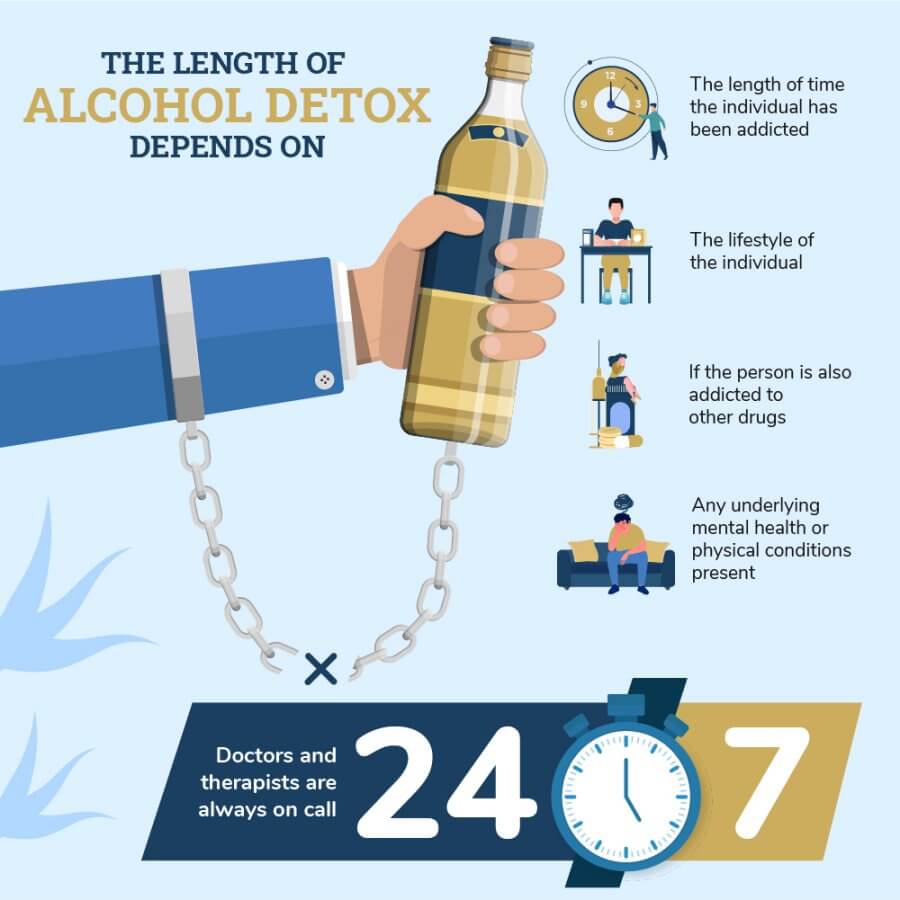
The above factors are used to determine the best types of therapies for each individual situation. Sometimes, only one-on-one therapy sessions are necessary. Other patients benefit from both family and group therapy. Patients at a rehab center are able to access different types of treatments to ensure their needs are met. Doctors and therapists are always on call 24/7.
Counselors are available to teach patients how to cope while living their best possible lives once treatment is completed and they leave the facility. One of the benefits of a rehab facility is the patients spend time with each other. This is advantageous since all of them are experiencing similar struggles. The patients offer understanding and support for everything they are feeling and experiencing. Rehab facilities are also equipped with both integrated and holistic treatment methods.
The treatments and progressive therapy were developed with the understanding the whole individual requires healing. Patients have a variety of therapies available, often including sports therapies, art therapies, relaxation therapies, yoga, and massage. These types of therapies have been shown to be effective for individuals with long-term alcohol addiction and those that have relapsed. Alcohol addiction is different for each individual because everyone is unique.
Sometimes, alcohol abuse is due to suffering resulting from different mental health conditions. Inpatient rehab centers and medical detox facilities are the most effective options available for treatment for individuals facing unique challenges. Some people are struggling because they are also addicted to other substances or drugs in addition to alcohol.
To maintain sobriety, it is critical these individuals have the support of their families while working with trained social workers, doctors and counselors. You should not hesitate to seek alcohol abuse treatment for your loved one. Talk to a licensed counselor available through medical detox centers. It is never easy to ask for help. You can be assured the admissions counselor will provide you with all of the help you need for the admissions process and discuss all of the treatment options.
Everything is confidential. The sooner your loved one receives the help they need, the sooner they can begin living a sober, well adjusted and fulfilling life. Learn more about Asana Recovery today.
Get Help Now (949) 763-3440
Alcohol addiction affects every aspect of life. A new life is just one phone call away. Contact Asana Recovery today.
Table of Contents

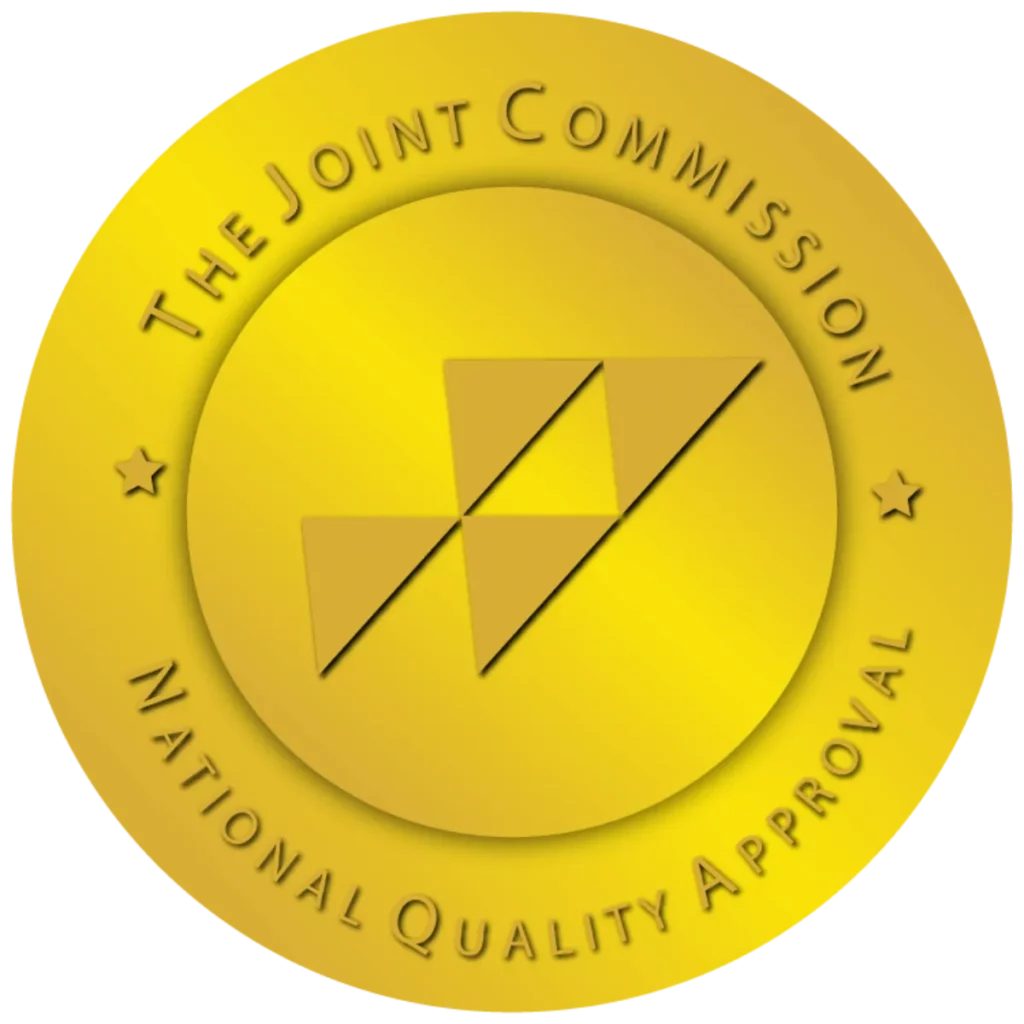

Resources
Programs
State Licenses
- 300043AP | exp. 08/31/2024
- 300043BP | exp. 02/28/2026
- 300043CP | exp. 11/30/2024
- 300043DP | exp. 04/30/2025
- 300043EP | exp. 06/30/2024
Accessibility
Accessibility modes
Online Dictionary
Readable Experience
Visually Pleasing Experience
Easy Orientation
Asana Recovery
Accessibility Statement
- asanarecovery.com
- April 25, 2024
Compliance status
We firmly believe that the internet should be available and accessible to anyone, and are committed to providing a website that is accessible to the widest possible audience, regardless of circumstance and ability.
To fulfill this, we aim to adhere as strictly as possible to the World Wide Web Consortium’s (W3C) Web Content Accessibility Guidelines 2.1 (WCAG 2.1) at the AA level. These guidelines explain how to make web content accessible to people with a wide array of disabilities. Complying with those guidelines helps us ensure that the website is accessible to all people: blind people, people with motor impairments, visual impairment, cognitive disabilities, and more.
This website utilizes various technologies that are meant to make it as accessible as possible at all times. We utilize an accessibility interface that allows persons with specific disabilities to adjust the website’s UI (user interface) and design it to their personal needs.
Additionally, the website utilizes an AI-based application that runs in the background and optimizes its accessibility level constantly. This application remediates the website’s HTML, adapts Its functionality and behavior for screen-readers used by the blind users, and for keyboard functions used by individuals with motor impairments.
If you’ve found a malfunction or have ideas for improvement, we’ll be happy to hear from you. You can reach out to the website’s operators by using the following email
Screen-reader and keyboard navigation
Our website implements the ARIA attributes (Accessible Rich Internet Applications) technique, alongside various different behavioral changes, to ensure blind users visiting with screen-readers are able to read, comprehend, and enjoy the website’s functions. As soon as a user with a screen-reader enters your site, they immediately receive a prompt to enter the Screen-Reader Profile so they can browse and operate your site effectively. Here’s how our website covers some of the most important screen-reader requirements, alongside console screenshots of code examples:
-
Screen-reader optimization: we run a background process that learns the website’s components from top to bottom, to ensure ongoing compliance even when updating the website. In this process, we provide screen-readers with meaningful data using the ARIA set of attributes. For example, we provide accurate form labels; descriptions for actionable icons (social media icons, search icons, cart icons, etc.); validation guidance for form inputs; element roles such as buttons, menus, modal dialogues (popups), and others. Additionally, the background process scans all of the website’s images and provides an accurate and meaningful image-object-recognition-based description as an ALT (alternate text) tag for images that are not described. It will also extract texts that are embedded within the image, using an OCR (optical character recognition) technology. To turn on screen-reader adjustments at any time, users need only to press the Alt+1 keyboard combination. Screen-reader users also get automatic announcements to turn the Screen-reader mode on as soon as they enter the website.
These adjustments are compatible with all popular screen readers, including JAWS and NVDA.
-
Keyboard navigation optimization: The background process also adjusts the website’s HTML, and adds various behaviors using JavaScript code to make the website operable by the keyboard. This includes the ability to navigate the website using the Tab and Shift+Tab keys, operate dropdowns with the arrow keys, close them with Esc, trigger buttons and links using the Enter key, navigate between radio and checkbox elements using the arrow keys, and fill them in with the Spacebar or Enter key.Additionally, keyboard users will find quick-navigation and content-skip menus, available at any time by clicking Alt+1, or as the first elements of the site while navigating with the keyboard. The background process also handles triggered popups by moving the keyboard focus towards them as soon as they appear, and not allow the focus drift outside of it.
Users can also use shortcuts such as “M” (menus), “H” (headings), “F” (forms), “B” (buttons), and “G” (graphics) to jump to specific elements.
Disability profiles supported in our website
- Epilepsy Safe Mode: this profile enables people with epilepsy to use the website safely by eliminating the risk of seizures that result from flashing or blinking animations and risky color combinations.
- Visually Impaired Mode: this mode adjusts the website for the convenience of users with visual impairments such as Degrading Eyesight, Tunnel Vision, Cataract, Glaucoma, and others.
- Cognitive Disability Mode: this mode provides different assistive options to help users with cognitive impairments such as Dyslexia, Autism, CVA, and others, to focus on the essential elements of the website more easily.
- ADHD Friendly Mode: this mode helps users with ADHD and Neurodevelopmental disorders to read, browse, and focus on the main website elements more easily while significantly reducing distractions.
- Blindness Mode: this mode configures the website to be compatible with screen-readers such as JAWS, NVDA, VoiceOver, and TalkBack. A screen-reader is software for blind users that is installed on a computer and smartphone, and websites must be compatible with it.
- Keyboard Navigation Profile (Motor-Impaired): this profile enables motor-impaired persons to operate the website using the keyboard Tab, Shift+Tab, and the Enter keys. Users can also use shortcuts such as “M” (menus), “H” (headings), “F” (forms), “B” (buttons), and “G” (graphics) to jump to specific elements.
Additional UI, design, and readability adjustments
- Font adjustments – users, can increase and decrease its size, change its family (type), adjust the spacing, alignment, line height, and more.
- Color adjustments – users can select various color contrast profiles such as light, dark, inverted, and monochrome. Additionally, users can swap color schemes of titles, texts, and backgrounds, with over 7 different coloring options.
- Animations – epileptic users can stop all running animations with the click of a button. Animations controlled by the interface include videos, GIFs, and CSS flashing transitions.
- Content highlighting – users can choose to emphasize important elements such as links and titles. They can also choose to highlight focused or hovered elements only.
- Audio muting – users with hearing devices may experience headaches or other issues due to automatic audio playing. This option lets users mute the entire website instantly.
- Cognitive disorders – we utilize a search engine that is linked to Wikipedia and Wiktionary, allowing people with cognitive disorders to decipher meanings of phrases, initials, slang, and others.
- Additional functions – we provide users the option to change cursor color and size, use a printing mode, enable a virtual keyboard, and many other functions.
Browser and assistive technology compatibility
We aim to support the widest array of browsers and assistive technologies as possible, so our users can choose the best fitting tools for them, with as few limitations as possible. Therefore, we have worked very hard to be able to support all major systems that comprise over 95% of the user market share including Google Chrome, Mozilla Firefox, Apple Safari, Opera and Microsoft Edge, JAWS and NVDA (screen readers), both for Windows and for MAC users.
Notes, comments, and feedback
Despite our very best efforts to allow anybody to adjust the website to their needs, there may still be pages or sections that are not fully accessible, are in the process of becoming accessible, or are lacking an adequate technological solution to make them accessible. Still, we are continually improving our accessibility, adding, updating and improving its options and features, and developing and adopting new technologies. All this is meant to reach the optimal level of accessibility, following technological advancements. For any assistance, please reach out to

